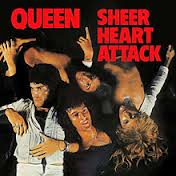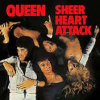 Originally published by L.S. Media. March 20th 2011.
Originally published by L.S. Media. March 20th 2011.
Sheer Heart Attack was the third album delivered by Queen onto the British public and the third within sixteen months. The album marks a turn in the band’s outlook and was beset with ill health and medical problems for guitarist Brain May who had been ill for the early parts of the recording.
With the band’s popularity spreading, not only in their home county where their previous album had reached the top five in the album charts, but also in the emerging markets of Australia and Japan, it is not hard to see why this particular album had all the hallmarks of one of the early classic albums by the band.
With tracks such as Brighton Rock which on the surface seems as though is one of the wonderful love songs the band would come to epitomise and Stone Cold Crazy which would go onto be covered by Metallica at Freddie’s tribute at Wembley, there can be seen a dark undercurrent than runs through it with its nod to Graeme Greene’s novel and the state of mind the band may have been feeling with the constant pressure of tour and recording.
The album includes one of Roger Taylor’s gems, the eclectic Tenement Funster. It wasn’t the first song that Roger had produced for the band but it comes across as one of the best he had done and would do with the positive exception of I’m in Love With My Car from the next album A Night at the Opera. Roger has a different style to both the flamboyant Freddie and the laid back manner of Brian, and taken out of context with the rest of the album it stands up to the test of time. Its gravelly tones and drum patterns fused with Brian’s guitar work make it a stand out contribution.
Sheer Heart Attack went onto become the bands first platinum selling record and would give the impetus to the band to deliver two consecutive number one albums. There may have been those that lament the passing dalliance with the Progressive Rock sound the band had created for their previous album but Sheer Heart Attack laid the foundations for what would be seen as the era that Queen dominated the charts and dominated the headlines.
Ian D. Hall
